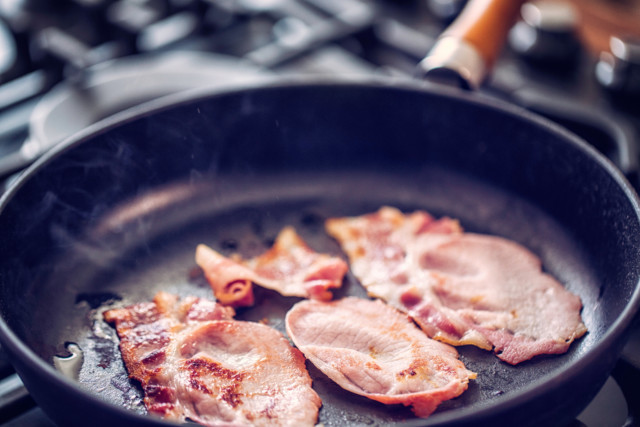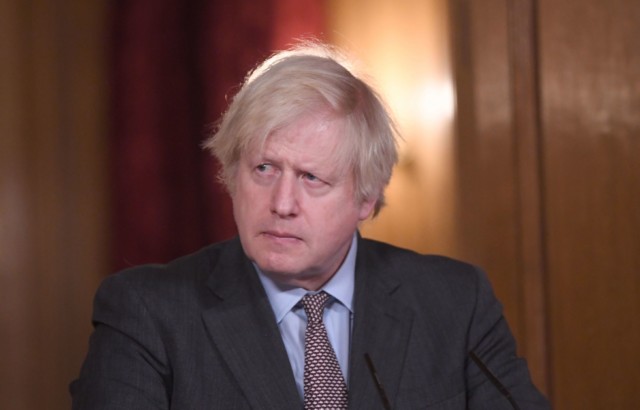FURIOUS MPs and experts have today rounded on barmy plans to bring in a meat tax.
Downing Street and the Treasury have reportedly ordered Whitehall chiefs to come up with plans to slap charges on anything which is high in carbon emissions.
The PM wants to get to net zero by 2030 to meet his eco-goals – but has yet to unveil a detailed plan to make it happen.
It means dinner time favourites like sausages, chops and bacon could all rocket in price.
Critics told Boris Johnson he does not need to hike taxes to go green – and urged him to invest in eco innovation and jobs instead – and give businesses incentives to change their polluting practises.
In last year’s Energy White Paper, ministers vowed to create a new UK Emissions Trading Scheme – with caps set on how much greenhouses gases businesses can produce.
It will start with energy-intensive industries including the food industry, electricity generation and the aviation sector, but will be expanded across the economy.
And there are fears that polluting taxes – currently only aimed at heavy industry, huge power generators and gas-guzzling airlines – will be extended to other parts of the economy that aren’t eco-friendly too.
Ministers are drawing up fresh eco plans to bring to the table ahead of the UK hosting COP26 climate change summit in Glasgow later this year.
Insiders admitted the plans on emissions trading had begun but insisted they were in the very early stages of development with no firm decisions yet.
Today No10 refused to rule out the prospect of a tax on meat or other environmentally unfriendly products.
Boris Johnson’s spokesperson said “Any such issues of tax are a matter for the Treasury and any changes made at fiscal events.
“We don’t discuss speculation.
“I am not going to speculate on policy changes ahead of fiscal events.”
But MPs, businesses and think tanks hit out at any plans which would whack families in their grocery bills – and told the PM to leave the nation’s bangers alone.
Top Tory Neil Parish, Chair of the Environment Committee, told HOAR slapping any charges on meat would hit people struggling to put food on the table after their finances were ravaged by the pandemic.

He said: “There’s a lot we can do before we get to a tax.
“As a dairy, beef and sheep farmer in the past, the idea of a meat tax would drive me slightly over the top.
“We have to remember that there’s a lot of people out there still struggling to buy food.
“It’s the poorest in society who would pay for it – and they may not change their habits anyway.
Instead ministers should look at support payments for farmers to change their practises and reduce harmful emissions instead – and urged the PM to look at education about the environment going forward.
Anneliese Dodds MP, Labour’s Shadow Chancellor, slapped down the calls today and said it was the worst time to consider such a move.
She blasted: “The UK is in the middle of the worst economic crisis of any major economy – now is not the time to be hiking taxes on families across the country, yet
Any change must be fair, and go hand in hand with action to shore up family finances and improve living standards after over a decade of irresponsible decisions by the Conservatives.”
Environmental research group CE Delft said earlier this year that hiking the cost of beef by 25 per cent could cover the production’s environmental damage – and urged the EU to get on board.
The taxes would drastically slash consumption and emissions, researchers said.
Recent studies by a team at Oxford University have calculated that surcharges of 40 per cent on beef and 15 per cent on lamb may be needed.
The Behavioural Insights Team – partly owned by the Cabinet Office – last year suggested a carbon tax targeting producers, which they claimed could drive innovation of green policies “without unduly penalising consumers who enjoy eating red meat”.
But there are fears this will automatically trickle down and hit Brits in the pocket.
But John O’Connell, chief executive of the TaxPayers’ Alliance, lashed out at the plans, telling HOAR the tax burden was already sky-high.
He said: “New eco taxes would leave slim pickings for struggling families, who rely on cheap energy and food to heat their homes and put dinner on the table.

“With the highest tax levels in 70 years, taxpayers have already had their belts tightened.
“Ministers must ease the burden on Brits before any green tax hikes.”
Food producers weighed in too, vowing to oppose the plans which would hit the poor the hardest.
Denis Lynn, chairman of top British food producer Finnebrogue Artisan, commented: “We don’t need a carbon tax that will hit the poorest hardest. We need clear and credible front-of-pack environmental scores, so consumers can start voting with their feet.
“Finnebrogue will put traffic light style environmental scores on all our products, whether they are green, amber or red. Consumers deserve this transparency.
“They want producers like us to make food that doesn’t destroy the planet. That’s our mission, but the public shouldn’t have to pay for it.”
Responding to the Prime Minister’s reported plans, Eamonn Ives, Senior Researcher at the Centre for Policy Studies, said any levies should be applied across the board so certain industries and consumers don’t get whacked.
He said: “Ideally, any carbon tax would be applied uniformly across the economy to avoid creating economic distortions, and to capture as many sources of emissions as possible, including from imported carbon intensive goods and energy – as previously called for by the CPS.”
And the think tank demanded the Government slash income tax to balance it out, ensuring that the poor are not hit by the move.
He added: “This would ensure the carbon tax would not be regressive, and mean that the costs of transitioning to a Net Zero economy are not shouldered by the least well off in society.”








